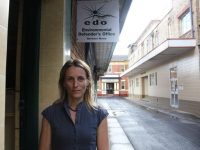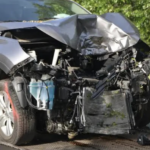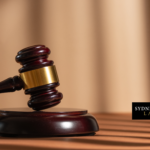Lawyers Protecting the Environment, An Interview with Sue Higginson

Sue Higginson isn’t your typical city lawyer. An environmentalist and former campaigner, she’s been working at EDO NSW (formerly the Environmental Defender’s Office) for the last ten years, and is now the organisation’s CEO and Principal Lawyer.
Before becoming a lawyer, Sue was involved in environmental campaigns, mainly focussed on protecting old growth forests in the Northern Rivers. She was eventually hired by the organisation to open its first regional branch office in the area.
“I learned after doing that for a few years, what I could do to really be effective working within the system to be able to protect the environment and seek environmental justice,” she said.
Ms Higginson recently sat down with Sydney Criminal Lawyers® to talk about EDO NSW’s work, and the potential effects of the Government’s new anti-protest laws.
Could you start by telling us a bit about EDO NSW, and the work you do?
We’re a community legal centre, and we specialise in public interest environmental law. What I would say about this community legal centre, and what I think is the reason for its success, is that we’re a multi-disciplinary legal centre. We take a public interest approach to law and focus on access to justice.
What that looks like in the ordinary course of things, we will get a phone call on our advice line, let’s say they’re a farmer living next door to a proposed mine. They say that somebody’s knocked on their door and said “we’re putting a very large coal mine next door.” They say they don’t know what to do or what their rights are and they need help to work their way through the system.
In addition to providing advice, in some circumstances one of our outreach lawyers may go and explain the law on mining proposals to the community, and from that meeting the community starts to understand its rights and how they can engage in the legal process in a meaningful way. Through our work with the community we are in a position to see how the law actually affects communities. This informs our law reform work, our law reform team uses these community experiences to propose ways to make the laws better.
We sometimes bring cases in Court where the case is a public interest case and it meets our case work guidelines.
Our work involves science, and involves getting independent experts engaged. We have an in-house scientist, and she manages a register of technical experts that have said they’re willing and able to assist the EDO and its clients, and ordinarily on a pro bono basis. We only respond to matters on the basis of sound evidence. We’re not a campaign organisation we are public interest environmental lawyers. .
Last year George Brandis accused you of ‘vigilante litigation,’ do you see that as an indictment or commendation of your work?
That was a very strange accusation. ‘Vigilante litigation’ is a sort of oxymoron in itself, if you’re engaging in a legitimate court process you can barely be called a vigilante acting outside the law. But the reason I thought it was so unusual was that it was a case that actually showed that the law is working, and that our engagement in the law is justified and necessary.
We commenced a case on behalf of our clients against the Commonwealth Minister for the Environment, alleging he made an error of law when he approved the Carmichael Coal mine. Before we even went to a hearing the Minister admitted that our client was right and that he had made an error of law. It was a very strange response from the Government, and a very unsound accusation from a responsible officer of the law, namely our Attorney General. When the law has not been followed by a Commonwealth officer the community ought to be able to bring a case calling on the Courts to invalidate that unlawful decision. That is democracy at work.
How have you seen Government attitudes toward the EDO, and environmental movement, change during your time as an environmental lawyer?
Over the last five years, the Commonwealth has been trying to wash its hands of environmental laws. It is really important to have strong Commonwealth environmental laws to protect matters of national environmental significance. We have many international obligations to protect the Australian environment and the Australian Government is best placed to ensure those obligations are fulfilled.
How do you see the see the Government’s new anti-protest laws affecting your work, and environmental protests across the state?
There’s a long history of environmental protest in New South Wales, and those protests leading to environmental protection and changes to environmental law. Many of our national parks and our iconic areas have maintained their environmental integrity because people put themselves out there to protect them.
These tenfold increases in penalties seem quite unnecessary, and the increase in police powers for both search and seizure, and then ‘move-on’ orders, has been critiqued from professional legal bodies, the Law Society and Bar Association, for being an arbitrary interference on people’s rights to possess property and to peacefully assemble in a public place.
I think the one that really stands out is the expansion of move-on powers, and their effect on the right of the community to gather and protest peacefully together in a public place.
Now, if the police decide that people gathering in peaceful protest should move on, and they don’t, they’re committing an offence in NSW. That has been viewed by legal expert bodies as a retrograde step in our laws and a breach of civil liberties.
What do you see as the future of the EDO NSW, in light of the recent funding cuts from the Federal Government?
From where I sit, the EDO has a very bright and important future. The pressures on the environment are growing at massive rates every day, as are communities wanting to protect the environment and their right to clean air and water and a healthy environment.
The changes to funding are really disappointing, people in Australia and the people in New South Wales deserve to have access to professional legal environmental services.
We’ve had to diversify our resource base rapidly, probably more than any organisation has ever had to, and we’ve done that very successfully. The community support for EDO is very inspiring.
We work hard, we work clever, and we’ve got some incredible lawyers that are willing to work around the clock and for half the money they would if they were using their skills for a profit based purpose. As long as we’ve got good willing lawyers, that are willing to work for these causes, and I suspect that will be forever, and for as long as the community needs this service, I think it will be here and it will grow.






